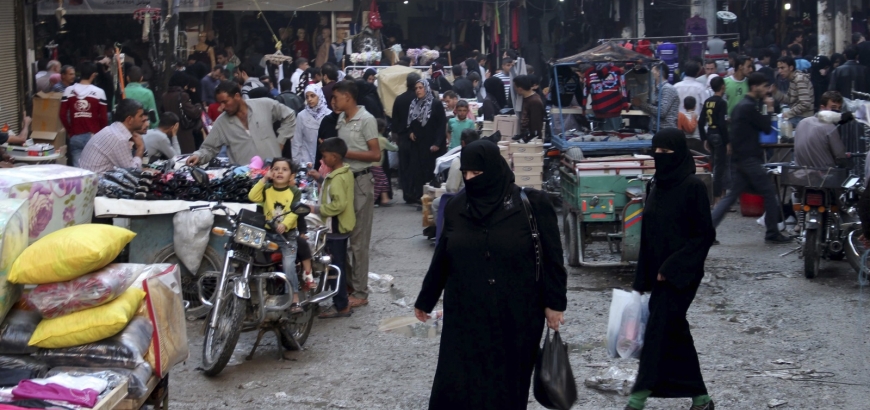The Central Bureau of Statistics in the regime government has revealed the latest study they conducted to determine the average estimated household expenditure for Syrian families in 2018, saying that it was 325,000 Syrian pounds per month, while the highest civil servant salary in regime institutions reaching no more than 100,000 pounds.
Bashar al-Qassem, head of commercial and price statistics in the Central Bureau of Statistics, said that the consumer price index (inflation) was 792 percent last year, based on the base year of 2010.
On an annual basis, the inflation rate rose 1.16 percent compared to 2017, with inflation being 782.9 percent, a rise from 662.9 percent during 2016, Qassem added.
With regards to food security, the bureau’s studies said that the proportion of food-insecure residents in 2015 reached 33 percent of Syria’s population, and then declined to 31.2 percent during 2017, without noting the rate for 2018.
Amjad, a civil servant in a government institution, said that, “securing a livelihood has become an obsession that worries us day and night.” He said that before the salary arrives, he goes to pay off debts.
He says, “I’m a civil servant and my salary is 40,000 pounds. I have three children. My wife is a civil servant as well, and despite that, we’ve had to bid farewell to red meat. I have forgotten its taste now. Gradually, we’ve also said goodbye to chicken.”
He said that there was also a big problem in terms of meeting water, electricity and phone bills, which have witnessed huge increases. Ironically, traders and industrialists are exempt from taxes and fees, while the poor and civil servants are obliged to pay them.
Fatima, a civil servant in another institution, says, “My family is composed of seven members. Per month we need at least 200,000 pounds to meet our needs, while my husband and my salary is no more than 70,000 pounds.” She added that if her family wanted to eat only falafel sandwiches for a month, the price of three falafel meals per day was 4,200 pounds—or about 126,000 for the month.
Adel, a vegetable seller, said that he was able to manage his affairs with support sent from his brother who lives abroad, which is about 100,000 pounds a month, helping him pay his rent.
From time to time, unofficial reports about the cost of living are published, with the latest claiming that 309,000 pounds are needed to cover five basic needs, while a family needs 237,000 pounds to stay at the poverty line. Meanwhile, average salaries range between 35,000 and 70,000 pounds between the public and private sector.
In May 2018, the bureau published the official data, or what is known as the statistical abstract, for 2012-2017, after the economic committee in the Prime Minister’s office permitted its publication.
The office noted on its website that it had not stopped working in recent years, but that it had not published data in compliance with advice from the economic committee. It said that once it had received permission, economic, social and residential statistics would subsequently be made available.
Haitham Eissa, an economics professor, said that the pace of the war had become less burdensome and that the military victories had restored large parts of Syrian territory to the state’s control. This then should lead to a lightening of economic stress and turning a large portion of resources to caring for citizens’ living situation. However, it must be noted that the majority of the forcible economic measures that began with the war have continued. In another sense, repairing and restoring the areas that have returned to state control could consume a large portion of resources, which have been provided by the end of the war in large parts of Syria. He said that it was not possible to say that the government administration has completed a totally successful plan to transfer the Syrian economy to solid foundations after the liberation of most Syrian territory. At the forefront of requirements of this plan is developing and implementing a realistic program for administrative reform. He says it is not possible to achieve economic progress or development, especially after a period of crisis in which administrations have deteriorated and corruption has spread within the administrative apparatus of the government, without a realistic and considered administrative reform process.
He closed by saying that on the level of the economy as a whole, there is a lack of clarity with regards to the bases of the economy, such as the nature of the national economy’s identity and its support and targeting mechanisms, as well as the economic and financial policies. This lack of clarity is reflected by the large portions of the national efforts that are going without achieving notable gains.
This article was translated and edited by The Syrian Observer. Responsibility for the information and views set out in this article lies entirely with the author.


